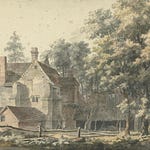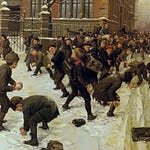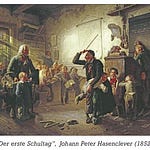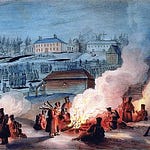For a lot of things, I’m about the youngest person you’ll meet who has strong memories of what was about to be swept away in something like a typhoon. That’s in part because I taught myself to read when I was three. My mother says it was earlier than that, but I don’t know.
In any case, I used to love to pore over maps, especially out of the World Book Encyclopedia, which we bought, I think, in 1964. I remember that in 1965, one of my Christmas presents was a street map of Allentown, where we lived for two years, and I’d spread it out on the floor and gaze at it in wonder. Anyway, when I had geography as a separate subject from third grade through sixth grade, I loved that too. You learn a lot about what people have to do to keep body and soul together, or to celebrate what they love the best, from the land they live on, and the mountains and rivers and lakes and the sea. Here’s something, for example: some places are right on the sea but there’s hardly a good harbor — Word of the Week — to be found. We landlubbers often suppose that the open sea is where most ships are wrecked, but it isn’t so; it’s when the ship is tossed too close to the land where there’s no harbor, and the rocks rip the hull out from underneath. It’s why the eastern coast of Italy has always been a lot poorer than the western coast, because between Ravenna and Brindisi there aren’t really any good harbors, not anything like Genoa or Leghorn (Livorno) or Rome’s Ostia or Naples. The United States has been most blessed with harbors, because the long smooth continental shelf of the Atlantic, and the long strips of sheltering islands off the coast, make for all kinds of “roads” for ships, not to mention such heavily indented bays as the Delaware and Chesapeake. Think of the firths of Scotland, too, or the great estuaries of the Thames, the Seine, the Bordeaux, the Don, and the Danube.
The harbor, then, is a safe shelter, with water deep enough for the ships, but usually shut in on two or three sides, so as to break up the stiff winds and the waves. There’s a great harbor where we live part of the year in Canada, in Arichat, Nova Scotia, which used to be a terrifically busy shipping port, especially for fish. “The notorious privateer Paul Jones,” as the American rascal and patriot John Paul Jones is called in a bill of damages I’ve seen in a museum, put in at Arichat Bay to bottle up the British and the Loyalists, and to this day you can see the two cannons they trained on his ships in case he got some worse ideas. That’s appropriate enough for this week’s word, since harbor actually does have to do with armies and shelter.
Have you ever felt harried? No, it doesn’t have to do with some irksome guy named Harry. That was just the way the Anglo-Norman people, speaking their French, pronounced the name Henri or Henry. So if your name is Harris or Harrison or Harkins, you had an Henri-Henry somewhere in your background. To be harried, literally, is to be beset with an Old English here (modern German Heer), meaning army. If your name is Harold, you’ve got it from Old English hereweald, meaning army-wielder, or strong in arms. An army is supposed to go forth against the enemy, but it also needs shelter and food, and that’s where the second part of the word comes in. A here-beorg was an army shelter, or quarters. It didn’t have to be an army in a ship — a navy; so the harbor didn’t have to be on water. Your herebeorg might well be a castle on a mountain. That would still be a harbor for you. And in fact we do use the word harbor, as a verb, to suggest protection, often for things or for people we shouldn’t protect, as in the phrase to harbor a criminal, or to harbor a grudge. Send that pickpocket packing, and float that grudge out to sea already! The second part of the word has a couple of cousins in Polish that have also to do with protection: a brog is a hay rick (it keeps most of the hay dry), and a brzeg is a bank or a shore.
But there’s another descendant that I find fascinating. How do you get your army some good digs, when they’re marching through the country? You want to send somebody ahead to announce your arrival and to make sure the people set things up. After all, an army marches on its belly, said Napoleon, though when he retreated from Moscow in the winter, there wasn’t much for those bellies to march on. Anyway, you send a Middle English herberger — from a French word that came from a Germanic word — just as, when you send a message up ahead, you send a messager, and if you are making a passage on a boat, you are a passager. Some time in the late Middle Ages, English speakers stuck an n into those words, for no particular reason that anybody can tell, so we have passenger, messenger, and — harbinger. Yes, the harbinger is the advance-man who says, “Guess what? Our army’s coming this way. Aren’t you happy!” And perhaps that’s why we use harbinger mainly in an ominous sense: a harbinger of doom. But it doesn’t have to be so. There are harbingers of joy, as we’ll see on Wednesday, with our Poem of the Week.
Word & Song by Anthony Esolen is an online magazine devoted to reclaiming the good, the beautiful, and the true. We publish six essays each week, on words, classic hymns, poems, films, and popular songs, as well a weekly podcast for paid subscribers, alternately Poetry Aloud or Anthony Esolen Speaks. Paid subscribers also receive audio-enhanced posts and on-demand access to our full archive, and may add their comments to our posts and discussions. To support this project, please join us as a free or paid subscriber. We value all of our subscribers, and we thank you for reading Word and Song!














